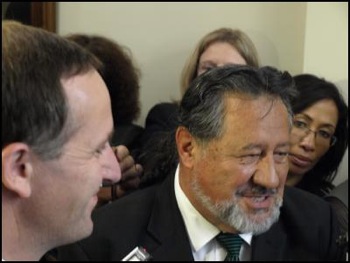I remember my maiden speech in parliament as if it were yesterday. Grown men wept. Even the parliamentary messengers looked up from their newspapers. By the next morning, I was the talk of Wellington. Leader writers rhapsodised. I was the face of a new generation, a leader in the making, the great hope of the nation. I was young, gifted and Slack.
Speech writers make shit up all the time. People only notice it when we say something ludicrously implausible.
But a good speech, one that makes people believe, well: that can be a thing of beauty, a moment of awe.
I speak now of the maiden speech and I address the nation's newest MPs.
Ladies and gentlemen, you are about to enter parliament. Your very first chance to shine will soon be upon you. After that, for quite a while, it may be no more than patsy lines at question time. Make the most of this moment.
Perhaps you've been quietly thinking: gee, it would be nice if I could sound like Barack Obama.
Let's be blunt: everyone wants to sound like Him; only He can pull it off.
But that doesn't mean you can't make yourself a much better orator. I offer you a short check list to put you on the right track.
1. Why are you here?
Complete this sentence: I came into politics because…..
Now: discard whatever you just wrote down, and try again.
You may have a stock answer you've been using for months or even years; we may well have heard it a thousand times before.
Don't settle for telling us what your party believes in, or repeating your stock phrase for the reporters; DIG. Try to recall a particular moment or event which has moulded your approach to life and politics; an injustice; a struggle; a revelation. A rip-off. A shock.
Tell us all about it. Show us the view of the world though your eyes.
Unless you are the very greyest of people, the most vacant-eyed of clones, there will be something about the way you look at the world that is new, and distinct.
Share that; we need fresh insights.
And so do you. Take your fresh insight and use it to guide your political career.
2. Disrobe
People lean forward in their chairs when you give them the unexpected.
We have many things on our minds that we keep to ourselves. Some should be kept there, but many others should not; we are the better for having them declared out loud.
Brave speakers embrace this idea.
Speak candidly, cut through the blandness.
Say what is in your heart. Be frank. Acknowledge the things you worry about in money, in work, in business, in relationships. Maybe you'll mention the coke you did in your thirties, maybe you won't mention the thing you have for high school uniforms.
What matters is that you acknowledge people as they are, and not as they represent themselves to be.
3. Thesaurus: not a small dinosaur
Barack Obama takes familiar ideas and commonplace observations and makes them fresh.
If you can produce just one line in your speech that sparkles enough to make the newspapers report it, you will have done well.
Write and rewrite, with Mark Twain's advice in mind:
The difference between the almost right word & the right word is really a large matter--it's the difference between the lightning bug and the lightning.
4. Tell a story
Management language is the curse of the modern world.
Management language loves to speak in the abstract.
You are here to share ideas, but not just in the abstract.
The best way to share ideas in a speech is to bring them to life with real people, real life, real stories.
How did Barack Obama describe the sweep of the 20th century? He told us the story of a 106 year old woman named Ann Nixon Cooper.
Tell us about the people you've met; the places you've been; the remarkable and dreadful things you have seen.
Take the stories of the people to the house of representatives and talk about the people you represent.
5. If you want to be Obama, do not try to be Obama.
The point of a speech is to achieve a connection.
They call Harvard Law graduates like Obama cool cats.
He speaks. The cool cat conveys his serene calm, his sure confidence, his perception and his empathy. The surely-crafted words buttress the style, and the style is buttressed by the truth of the words.
There is authenticity, and lyricism, and a connection between speaker and audience is made.
Make your character as evident as he makes his. You will be judged, as he has, by its content.
6. Arrive, and remain, realistic.
Winston Churchill was once asked, "Doesn’t it thrill you to know that every time you make a speech, the hall is packed to overflowing?"
"It’s quite flattering," he replied.
"But whenever I feel that way, I always remember that if instead of making a political speech I was being hanged, the crowd would be twice as big."
